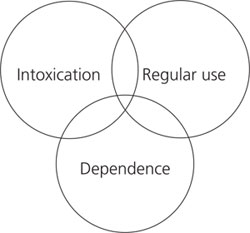PDF 111 KB
A fact sheet for health professionals including antagonists, use in pregnancy and withdrawal from treatment
People who use alcohol and other drugs may not be open about this and are often reluctant to seek treatment. They may lack insight into the negative consequences of their drug use, and they may be in a state of denial about their level of use. When people present to GPs and other primary health services there is an opportunity to identify and address alcohol and other drug use. In many instances people present with problems that may actually be related to alcohol and other drug use, and making that link is a crucial first step. Where people are not severely alcohol or drug dependent, brief interventions can result in substantial reductions in use and levels of risk.
There is considerable variation in how much and how often people use alcohol and other drugs. The nature and severity of problems, or the risk of problems, related to alcohol and other drug use also varies. This is represented by the diagram below:
Short-term harms are often associated with intoxication problems such as hangovers, alcohol-related violence, drink driving offences etc.
Regular use may result in problems that are health-related (eg hypertension, cirrhosis associated with regular alcohol intake) or may affect relationships or finances.
Dependence is where there is loss of control, use has become compulsive, and there are likely to be significant problems related to alcohol and other drug use.
People may experience harms in any one of these areas at any one time, or in more than one area at any one time. Similarly, different problems may occur at different times in a person's life.
When talking to a patient, it can be helpful to look at whether problems associated with use can be considered in each of these areas; it may assist a patient to recognise that, for example, their binge drinking is causing short-term problems such as absences from work with a hangover.

Information about screening for substance dependence and intervention for substance dependence is located below.
Open with a general question first, for example:
Screening helps identify alcohol and other drug use, the degree of risk associated with use, and associated problems. Early identification of drug problems generally leads to better treatment outcomes.
There are standardised tools to assess alcohol and drug use and its severity in an individual that help to consider the degree of help required. The ASSIST screening and brief intervention is one of the tools recommended for screening for hazardous or harmful alcohol or other substance use (including tobacco). Once an initial assessment has been completed using the ASSIST, the scores will indicate the level of problems and whether intervention is indicated.
The AUDIT and CAGE are alternative screening tools that are specific to alcohol.
The ASSIST and AUDIT packages address a broad range of levels of use and also have resources on the provision of brief interventions. CAGE screens for high-level dependent drinking only and does not identify moderate risk drinking.
The results of screening should be discussed with the client in a non-judgmental, supportive manner. The purpose of screening should be to begin an open discussion about drug use.
If use is associated with a high risk of dependence or other problems, more intensive intervention is likely to be required. Offer treatment or refer for treatment as appropriate. If the patient is willing to accept treatment, provide information on the risks associated with their level of alcohol and other drug use, ways to reduce the level of risk, and treatment options – this may result in acceptance of treatment at a later date.
Although the exact composition of a brief intervention may vary, there are common elements and these have been described in a number of ways. One example uses the acronym FRAMES:
Alcohol and Drug Information Service (ADIS)
Telephone: 1300 13 1340
Drug and Alcohol Clinical Advisory Service (DACAS)
DACAS provides a telephone and email service for South Australian health professionals seeking clinical information and clarification around clinical procedures, guidelines and evidence-based practice.
Telephone: (08) 7087 1742 — 24 hours 7 days/week including public holidays or email your enquiry to: HealthDACASEnquiries@sa.gov.au.
This service does not provide proxy medical cover and cannot assume responsibility for direct patient care.
ASSIST (Alcohol, Smoking and Substance Involvement Screening Test)